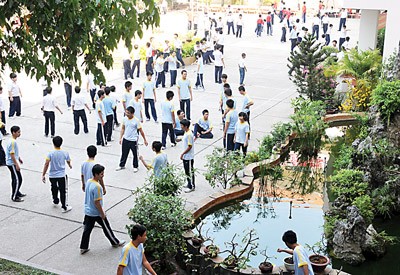The Ministry of Education on Tuesday issued an official dispatch to Education and Training departments throughout the country on preventing violence among students.

Accordingly, the ministry proposes that school managerial boards strengthen the teaching of ethical behavior and organize regular events to educate students about the law, moral conduct, and national cultural traditions.
Critics, however, say that the ministry’s recommendations are good on paper, but not actually feasible in the current context of the country’s education system.
School staff say it is virtually impossible to teach students about good moral conduct as current academic curriculums are extremely intense. Teachers complain that course content is so heavy, it is a race against time just to cover all material outlined in State-regulated syllabi.
Some experts say that the intense coursework may in fact be a contributing factor to school violence. Students are under great stress to learn enormous amounts of material in a short period. They may then be more likely to act out aggressively as they don’t know how else to deal with their feelings of frustration.
Many students have never learned how to practice self control and teachers, meanwhile, don’t have the time needed to address such problems.
With a focus on academic learning above all else, most schools offer little in the way of extra-curricular activities, which would give students an outlet to express themselves and communicate with other students and teachers in a meaningful way.
Thus, some say that if the education ministry wants schools to strengthen their teaching of moral conduct to students, priorities need to be shifted.
Rather than focusing on teaching vast amounts of factual knowledge, schools may want to consider introducing more extracurricular programs so that teachers and students have the chance to learn more about each other. This would also give teachers more time to listen to the needs of their students and address their concerns to stop violence at its roots.
























